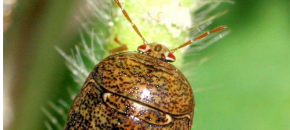Potato Disease Forecasting Report 7-23-13 – Click to Download We will be tracking DSVs for Late blight development and calculating P-days for initiating the first early blight fungicide application. The first late blight fungicide application is recommended once 18 DSVs accumulate from green row. Green row typically occurs around the first week in May in southern […]
Continue reading...Kudzu bug in the Region

As predicted, the kudzu bug has appeared in our region. The first specimens have been found by a private consultant in southern Delaware and other specimens have been found in Harford, Maryland, northeast of Baltimore. Since its discovery in Georgia in 2009, the bug has rapidly spread across the southeastern US, now from Louisiana to […]
Continue reading...Vegetable Briefs – 7/20/13
Cucurbit downy mildew (CDM) has been reported on cucumber throughout the state. All cucurbit growers should scout their fields on a regular basis and should add downy mildew specific fungicides to their regular maintenance program. CDM should be making the jump from cucumber to other cucurbit crops soon, if it hasn’t already done so. If you find […]
Continue reading...Late blight update – 7/20/13
There have been no new reports of late blight in New Jersey this past week. Late blight was reported in Northeast OH, Western NY and Lancaster, PA this past week. The extremely hot, dry weather this week throughout NJ has most likely reduced the immediate threat of late blight, but growers should remain cautious because the pathogen could […]
Continue reading...Tomato Disease Forecasting Report 7-19-13
7-19-13 Tomato Report – Click to Download Disease severity values (DSVs) for early blight, septoria leaf spot, and tomato anthracnose development are determined daily based on leaf wetness (due to rainfall, dew) and air temperature. On a daily basis DSV values can range from 0 to 4 where 0 = no chance for disease development […]
Continue reading...Potato Disease Forecasting Report 7-19-13
Potato Disease Forecasting Report 7-19-13 – Click to Download We will be tracking DSVs for Late blight development and calculating P-days for initiating the first early blight fungicide application. The first late blight fungicide application is recommended once 18 DSVs accumulate from green row. Green row typically occurs around the first week in May in southern […]
Continue reading...